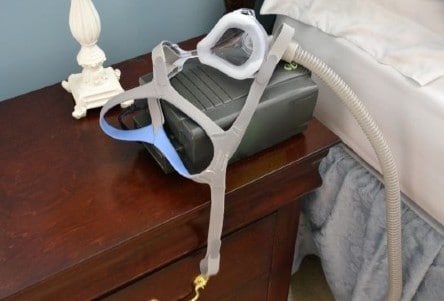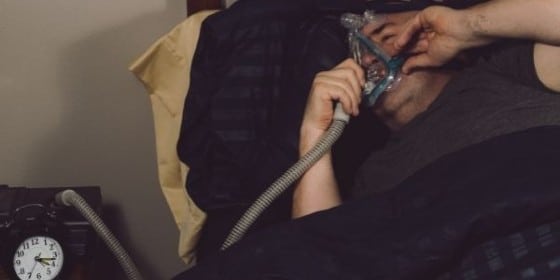CPAP machines are very useful to improve the quality of sleep for those with sleep apnea. With obstructive sleeping apnea, for instance, there is a lot of snoring which is disturbing to those around. A CPAP machine however solves the problem but unfortunately, it oftenmakes a noise of its own. And so in this article, we’ll learn how to make a CPAP machine quieter, and effectively reduce CPAP noise when inhaling.
In a hurry to find out what the best solution is for a CPAP machine that’s making noise? Here is the quick one for you. First, you can change your CPAP machine entirely to a newer and quieter model. If your machine got noisy over time, then try washing or changing the filter. Using CPAP Muffler is another thing you can do to reduce CPAP noise when inhaling
How to Make a CPAP Machine Quieter
1. Replace The Machine Filter Regularly

By replacing the filter regularly, you not only reduce the noise that it produces, but you also stay healthy and help the CPAP machine run smoothly.
Note that the noise from a machine due to a noisy filter is because the machine overworks to compensate for the loss in function.
It’s not difficult and expensive to replace a dirty filter, and so you can get your filter quiet and running smoothly without doing much.
2. Use A CPAP Muffler

So if you are noise sensitive, or stay with someone who is noise sensitive, using a CPAP muffler would significantly reduce machine noise.
3. Use a Quiet CPAP Machine
This is a more expensive move to make, but it’s very effective. If your CPAP machine is noisy and a problem to you, then consider changing it entirely if nothing has worked to quiet it.
As technology grows, newer models are made and they keep getting quieter. So a new machine with a low decibel level may be the permanent solution you have been looking for after all.
Quiet CPAP machines, or sleep apnea machines are made with performance in mind as well. So being less noisy doesn’t in any way mean you would be getting less performance.
They are specially designed to work with as little noise as possible for even better sleep.
4. Keep The Machine Strategically Away from You
By changing the position of your machine, the noise will be less disturbing to you. Most people commonly place the machine on the nightstand next to their head or the same level as their ear. In this position, the noise would be a huge disturbance to you but when placed below your bed, it’s less noisy.
You could consider using a longer hose with your CPAP machine to increase its distance from your head. Using a longer hose isn’t expensive and it comes with a lot of benefits.
The con however of using a long hose is that there is a higher chance of condensation of the humid air. This is referred to as going through a rainout and is pretty risky.
5. Use an Anti-Vibration Mat

This may be the cause of your CPAP machine being noisy when in use.
The best remedy for this situation is to place your machine on a soft surface such as an anti-vibration mat.
6. Use A Quiet Mask
Not every CPAP machine sound comes from the machine itself. Sometimes the noise comes from the mask. It could be that the mask is a noisy one, or that it is faulty and needs to be fixed or replaced completely.
Either way, you would need to go for a mask that is proven to be quiet. This way, you and those around you can have better sleep quality with less noise.
If the mask you are using however becomes noisy all of a sudden, then it could be because of something loose that needs to be fixed.
There could be a hole in the machine that’s causing the noise or something else. Try locating the source of the problem and then rectify it.

CPAP Machine Making High Pitched Whining Noise
When your sleep apnea machine makes a high-pitched whining or whistling noise, it can greatly interfere with your sleep. To fix this issue, there are some steps you can take which include:
1. Check The Hose Connection
One of the causing of a high-pitched CPAP machine whining noise is a loose hose to machine connection. If this is the case, you can easily fix it by simply unplugging the hose, and then adjusting it to fit in properly.
Apart from an improper fix, the presence of cracks and holes can also cause loud whistling and whining noise. And so if you notice any form of damage to your CPAP hose, replace it immediately.
2. Check That the CPAP Mask Fits
If your CPAP mask fits properly, it would prevent the escape of pressurized air preventing whistling noise. You can detect a leak from your CPAP mask when you hear a noise as you inhale.
If you hear high whistling noise, adjust the mask to fit properly using headgear straps. If this doesn’t remedy the situation, then you may need to use a different size cushion.
Several mask-related situations can cause CPAP mas noise such as cracked frame, clogged diffuser, or a damaged cushion. In the case of a damaged cushion, replace it as soon as possible. If your diffuser is clogged, clean it out using a toothbrush or bristle brush. Read also: Best Quietest Electric Toothbrush 2024
3. Check The Humidifier
The use of a humidifier with your CPAP machine can make your sleep even more comfortable. But with use, there becomes CPAP machine whining noise especially if there is any damage.
A common cause of such high-pitched sounds is the presence of cracks on the equipment.
4. Replace The Filters
Dirty filters are a common cause of CPAP whining noises, so by cleaning regularly, you help the machine work smoothly. Depending on the brand, the filter should be replaced every two to four weeks and washed weekly. Doing this will improve the performance of your CPAP machine as well as increase its lifespan.
How Loud Is a CPAP Machine?
The average CPAP machine sound is about 30 decibels, meaning that it’s not completely quiet. Even though it’s mostly white noise, light sleepers would have difficulty sleeping.
The good news however is that the measurements are done close to the machine, so with the right tips as stated above, you can quiet your CPAP machine further.
Also, note that the pitch of CPAP machines contributes to how the sound is perceived. This is because the pitch distinguishes one sound from another and so even at the same decibel rating, two devices can sound different.
Some people don’t have a problem with high-pitched sounds while others can’t handle it. So consider this when making a purchase.
Final Words About CPAP Machine Noise Reduction
If you wondereded how to reduce CPAP noise when inhaling, then the tips here will come in useful. Most times, the noises your CPAP machine makes are a result of the minor maintenance that is needed.
By washing the filter regularly or replacing it when due, you would reduce the CPAP machine loud sound significantly.
You can also reduce the vibration noise by placing the machine on an anti-vibration mat or reduce noise by using CPAP Muffler.
Ultimately, if you are using an old model CPAP machine, consider changing it to a newer and specially designed quieter model.

Dave Pearson is a Canadian musician, sound editor, and audiophile. He is also the founder and owner of the website SoundProofGeek. On SoundProofGeek, Pearson offers advice and resources on audio equipment, including how to assess and improve audio quality, how to troubleshoot and repair audio equipment, and how to improve the music listening experience.
Table of Contents

